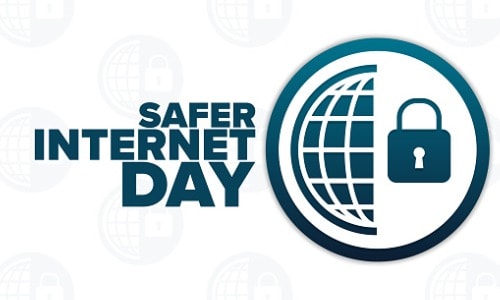

What Is Safer Internet Day?
Safer Internet Day is an annual global event held on the second Tuesday of February to promote safety tips on using the Internet. It aims to raise awareness about potential online risks such as cyberbullying, online predators, and identity theft. It also aims to provide tips and resources to help people stay safe online.
History of Safer Internet Day
Safer Internet Day was first celebrated on February 7, 2004. The event was created by the Insafe network, a European network of awareness centers promoting Internet safety and digital literacy.
Over the years, Safer Internet Day (or Internet Safety Day) has grown in popularity and is celebrated in many countries worldwide. The theme changes each year and focuses on a specific aspect of Internet safety.
Why Should You Care About It?
Safer Internet Day is an important event highlighting the importance of Internet safety and the potential risks people may face while using the Internet. As a result of participating in and learning about Internet safety, you can protect yourself and your loved ones from online dangers.
How Can You Stay Safe Online and Protect Your Privacy?
By following these tips, you can help to keep yourself safe online and protect your privacy.
Use a Strong Password
- Aim for a password of at least 12 characters. The longer the password, the stronger it will be.
- To create a secure password, use a combination of capital and lowercase letters, special characters (#,@, etc.), and numbers. This will make it easier to guess.
- Don’t include your name, birth date, or other personal information in your password. This information is often accessible for attackers to guess or find out.
Don’t Use the Same Password for Multiple Sites
Using the same password for multiple accounts is not recommended, as attackers can quickly gain access if they get ahold of one of your passwords. However, a password manager can help generate and store secure, unique passwords for all your accounts.
Enable Two-Factor Authentication Whenever Possible
Two-factor authentication is an additional security measure that helps protect critical online accounts from unauthorized access. Specifically, it requires you to enter a unique code after receiving it via a text/Whatsapp message or email. Enabling two-factor authentication is a good idea for any online account. Many services offer it as an option, so it should be taken advantage of whenever possible.
Be Cautious of What Information You Share Online
Be aware of the personal information you share online, as it can impact your privacy and security. Consider the potential consequences before you post, avoid sharing sensitive data, adjust your privacy settings on your social media accounts and other online services, and be cautious of people you don’t know who ask for personal information.
Review Your Privacy Settings for Your website or Remote Employees
Review and adjust the data privacy settings for remote employees on your website to only share necessary information. Additionally, you should clarify the privacy policy to explain what information is collected, how it is used, and who it is shared with. Manage who can view the information and monitor the use of personal data to ensure it is used appropriately.
Delete Old Social Media Accounts That You No Longer Use
It is a good idea to periodically review your social media accounts and consider deleting any that you no longer use.
Here are a few steps to delete old social media accounts:
- Log in to the account you want to delete.
- Look for the account settings or privacy settings.
- Find the option to deactivate or delete the account.
- Follow the prompts to deactivate or delete your account.
- If the option to delete your account is unavailable, you may need to contact the site’s customer support for assistance.

Biggest Dangers of the Internet and How You Can Avoid Them
The Internet can be risky, with potential dangers such as cyberbullying, online predators, identity theft, and malware. To protect yourself and your family, be mindful of what you say online, treat others respectfully, use strong passwords and two-factor authentication, keep software and devices up to date, and use antivirus software.
Scams and Cybercrime
Scams and cybercrime are criminal activities that take place online. These activities range from scams that ask for personal information or money to more serious cybercrimes such as phishing emails, identity theft, and data breaches.
Be cautious when clicking on email links or attachments from unknown sources; only provide personal information if the request is legitimate.
Cyber Predators
Online predators may try to establish a false trust with their target to exploit them. With this in mind, it is vital to be cautious about sharing personal information, avoid conversations with strangers, and utilize parental controls on devices and accounts.
Data Theft
Data theft is the unauthorized access or theft of sensitive information, such as personal data, financial data, or intellectual property. Cybercriminals can steal data through various means, including hacking, malware, physical device theft, and manipulation.
How To Deal With Online Threats
It is crucial to be proactive and protect yourself and your devices to deal with online threats.
You can follow these best practices to help reduce your risk of being affected by online security threats:
- Use long, complex, hard-to-guess passwords, and consider using a password manager.
- Add an extra layer of security with two-factor authentication to your accounts.
- Ensure to use the latest version of your operating system and web browser, and keep your security software and antivirus up to date.
- Be careful when clicking on links in emails. Some spam emails may contain malicious links or attachments that can harm your computer or steal your personal information.
- When shopping, banking, or accessing different records online, use a secure link with HTTPS.
- Control who can see your information and activities by viewing and adjusting privacy settings on your social media accounts and other online services.
- Think carefully about the information you share online and its possible consequences.
Create a More Positive and Safe Online Environment
Creating a positive and safe online environment requires respecting others, learning about Internet safety best practices, and reporting online abuse when encountered. Additionally, you should consider supporting organizations that promote Internet safety and raise awareness about online risks.
Final Thoughts
In summary, the Internet can be an excellent resource for connecting with others, accessing information, and conducting business. However, it is crucial to be aware of the potential risks and take steps to protect yourself and your devices. Following good security practices, such as using strong and unique passwords, enabling two-factor authentication, and being cautious about what you share online, will help you avoid online threats. The annual Safer Internet Day aims to educate people about these issues and provide resources to help them stay safe online.
Join Safe Internet Day to learn more about online safety and take precautions to keep yourself and your loved ones safe. When we work together, everyone’s online experience can be safer and more positive.
[ad_2]
Source link






